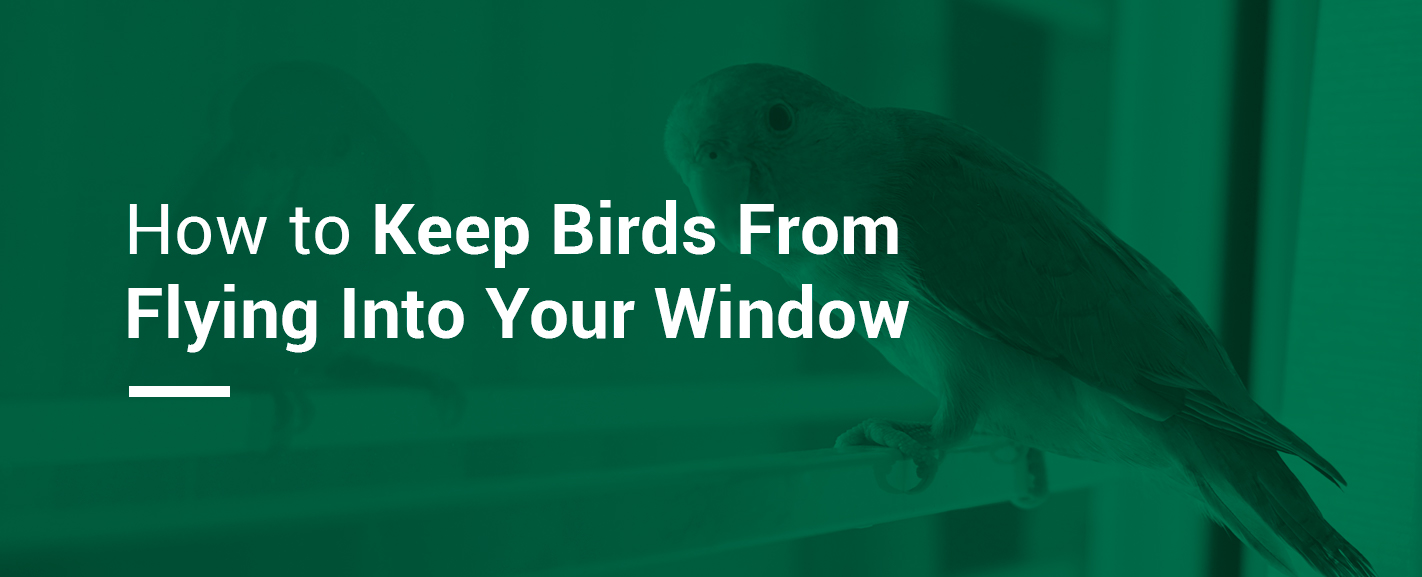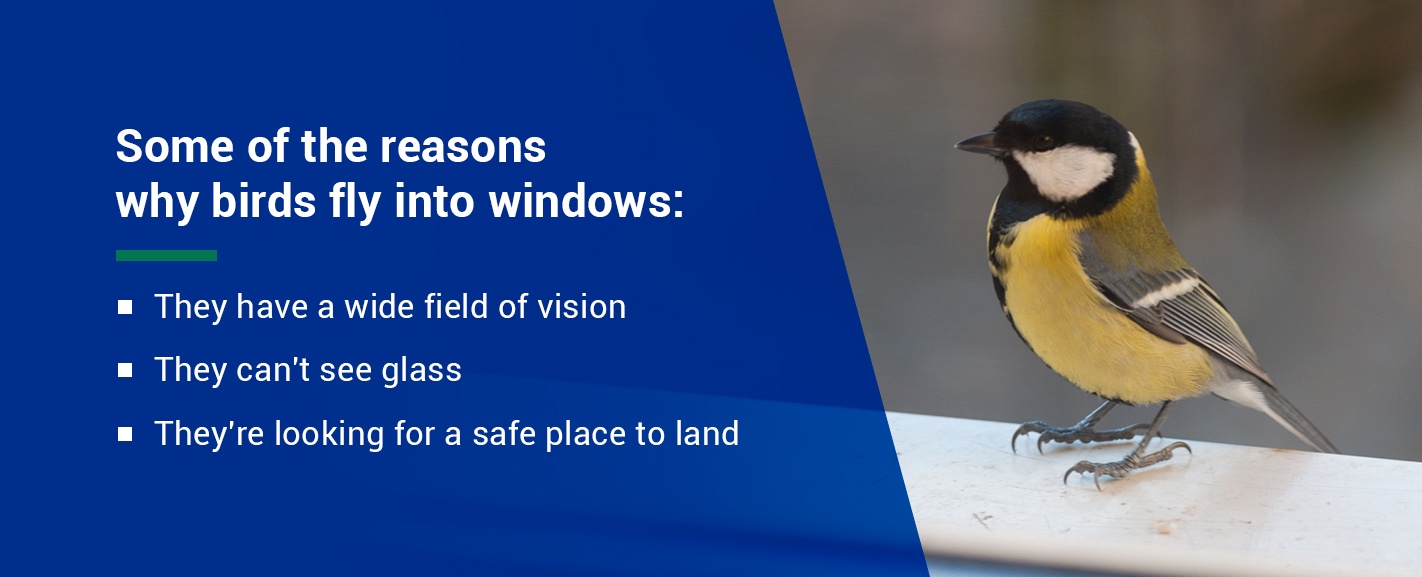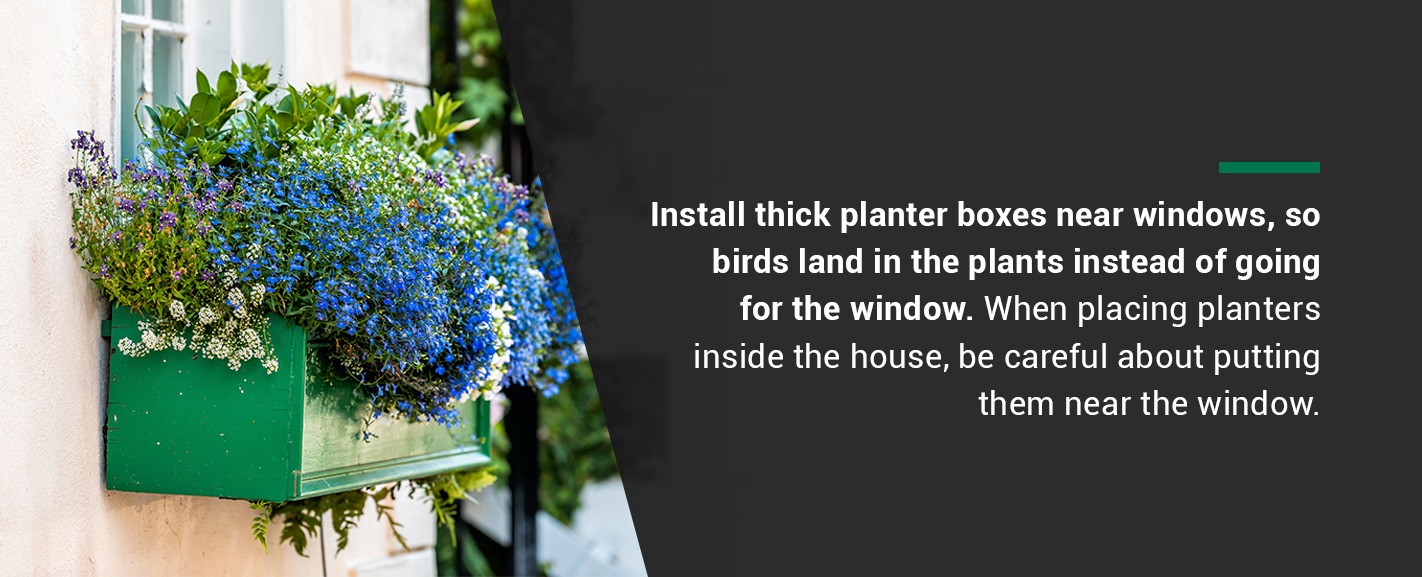
You may have heard bird-window collisions take place outside your home. Birds look for safe places and food sources as they fly. As a result, they may try to get into your house if your windows display a comfortable environment for them. If your window is closed, you’ll hear a thud as the bird hits your window.
Window collisions by birds are both a nuisance for homeowners and a danger for birds. Protect the bird population and your home by preventing birds from crashing into your windows. Here are some tips for how to keep birds from flying into your window.
Why Do Birds Fly Into Windows?
Up to 1 billion birds — or 5 to 10% of the current bird population — die from window collisions each year. Residential buildings with one to three stories account for 44% of those deaths. Birds also fly into skyscrapers and other types of commercial buildings.
The United States bird population has decreased by 30% since 1970. Birds flying into windows is the second-highest cause of human-related fatalities, with habitat destruction as the highest. Even though bird window strikes are annoying, they’re also dangerous for birds.

Here are some of the reasons why birds fly into windows:
- They have a wide field of vision: You may think that birds fly into windows because of their poor eyesight or a lack of intelligence. Since birds’ eyes are on the sides of their heads, they actually have a 360-degree vision. This eyesight helps them see predators or sources of food. Since their field of vision is so wide, birds have difficulty focusing on objects right in front of them.
- They can’t see glass: Birds fly into windows because transparent glass is invisible for birds. While humans use door and window frames to detect the presence of a piece of glass, birds don’t have that ability. They perceive reflections as actual objects. Any food, animals or plants they see could make them attack.
- They’re looking for a safe place to land: Birds fly to look for a safe place to land, especially if they feel threatened. When birds see food or plants in your window, they will want to go inside your house. Large windows are the most dangerous, but birds could also fit through small windows.
Birds often die when they strike a window. Sometimes the impact stuns them, and they fly away after recovering. Birds that hit windows suffer hemorrhaging in the head and could die later. Surviving birds often develop disorientation, which leaves them vulnerable to predators.
Bird Strike Prevention Methods
Some birds experience paralysis instead of death when they hit windows. The Humane Society of the United States provides tips for how to treat birds that have survived window collisions. If you see a lifeless bird on the ground outside your home, use care when dealing with it. Here are the proper steps for taking care of a bird that may have hit your window:
- Pick up the bird in a towel with care and put it inside a cardboard box or paper bag with proper ventilation.
- Keep the bird in a quiet place, away from activity.
- Check on the bird every 30 minutes. Keep your hands off of the bird during your check in.
- When the bird shows signs of recovery, bring the cardboard box or bag outside. Give the bird some space to try to fly. If it stays in its bag or box, bring it back inside.
- If the bird shows no sign of recovery over the next few hours, bring it to your local wildlife center.
You could add decorations to your windows to reduce window reflections. You could also try to limit the window reflections inside your home. Here are some suggestions for how to prevent bird strikes:
- Window screen or netting: Screens and nets attached 2 to 3 inches from the window will reduce reflection. Taut window screens also provide a safe cushion for birds in case they fly into the window.
- Tape strips: Use one-way transparent tape that appears opaque from the outside but clear on the inside. If you use mirrored film, the bird could still see its reflection. Space quarter-inch vertical strips about 4 inches apart. Space eighth-inch horizontal strips about an inch apart.
- External shutters: Close shutters on a cloudy day or when you don’t need your windows. Even if you leave them partially open to let in sunlight, you will reduce window reflections.
- Soap or tempera paint: You could wipe on soap with a sponge. Rainwater-resistant tempera paint is a great exterior window decoration for preventing bird strikes.

- Planters: Install thick planter boxes near windows, so birds land in the plants instead of going for the window. When placing planters inside the house, be careful about putting them near the window. Birds will try to sneak inside to be near your planters.
- Decals and wind chimes: With window decals, a bird won’t see its reflection as a threat. Wind chimes that sway in the wind also deter birds because they don’t like the movement and sound. Since birds fly through small spaces, you should put window decals close to each other. Also, using window decals of owls or other birds will make birds want to attack your windows.
- Move feeders and baths: Put your feeders or birdbaths no farther than 3 feet or no closer than 30 feet. Bird feeders closer than 3 feet to the window will help birds land there instead of your window. Bird feeders farther than 30 feet from the window will keep birds away from your home.
- Blinds and curtains: Close blinds and curtains when you’re not home or when you’re not using that room. You could also invest in sheer curtains that let in natural light but hide the window.
- Lights: Lights shining through a window can disorient migrating birds. Nocturnal birds use the light of the moon to try to find shelter. They might become confused when they see a light coming out of your window. Turn off the lights of a room that’s not in use.
- Replace your windows: If you need new windows, consider upgrading to bird-safe windows. Consult with a company that does custom window fittings. You could get windows with fritted glass, angled glass or UV-reflective glass. These types of windows will make your windows less attractive to birds.
Replace Your Windows With Garrety Glass
If a bird does hit your window and causes damage, you might need to have it replaced. Our team at Garrety Glass provides high-quality window replacements for your home near York, Pennsylvania, and northern Maryland. Our energy-efficient windows are complete with a lifetime warranty. Speak with one of our professionals today by filling out an online form or calling us at 717-741-9949.